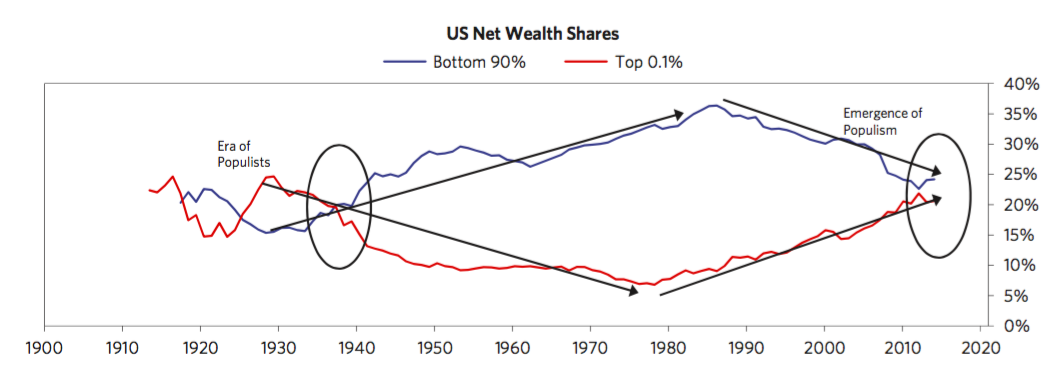Jan. 31st, 2019
A good thought experiment
Jan. 31st, 2019 10:53 am...contrary to popular belief, the deleveraging dynamic is not primarily psychological.
... if everyone went to sleep and woke up with no memory of what had happened, we would be in the same position, because debtors’ obligations to deliver money would be too large relative to the money they are taking in.
...a big part of the deleveraging process is people discovering that much of what they thought of as their wealth was merely people’s promises to give them money.
-- Ray Dalio, Principles for Navigating Big Debt Crisis. p25.
This is an excellent way to think in the present. Obligations to deliver vs income creates a gradient for action.
Comparative [dis]advantage
Jan. 31st, 2019 11:50 amHow can we explain to people that the lack of roads across the border is the real wall? It's just basic physics applied to a business model. You simply cannot drive an 18-wheeler truck through a remote desert, which makes drug smuggling inefficient. Moreover, hiring hundreds of people to carry small payloads into another country is a security and logistics nightmare, compared to hiring one truck driver and bribing one border agent.
https://thehill.com/policy/healthcare/427893-border-officers-make-largest-fentanyl-seizure-ever-in-arizona
The Republic reported that the drugs were hidden in a truck that was also carrying cucumbers.
Serendipities
Jan. 31st, 2019 05:21 pmLast Friday, my former student told me to read The Big Short, which I did (the book is much better than the movie). Then, I decided to get a different perspective and read Ray Dalio's PFNBDC – still working through it.
In the meantime, I'm catching up on Deleuze: What is Philosophy and Expressionism in Philosophy (Spinoza).
Along the way comes Vlad's post on Functional Programming. What the hell is FP? Why would people use it, instead of whatever they are using now.
It turns out that one of the key reasons for using FP, according the interwebs, would be no side effects in the resulting software. This is interesting because Deleuze says that science creates functions on the plane of reference. "it is this idea of the function which enables the sciences to reflect and communicate." The article in SEP says that "Functions predict the behavior of constituted systems, laying out their patterns and predicting change based on causal chains."
Separately, Romer talks about codified knowledge as the non-rival input essential to growth through innovation.
We can imagine that all of that alludes to methods for constructing a path through reality without side effects.
Now, let's go back to the financial crisis. It appears that in the financial industry side effects are endemic. Moreover, I get an impression that financial products/innovations, e.g. mortgage bonds, CDOs, etc., are designed with side effects baked in, esp. in shadow banking and private finance (because you want to get around regulations during the growth stage).
The question is: how can we study a financial crisis in the making scientifically?
In the meantime, I'm catching up on Deleuze: What is Philosophy and Expressionism in Philosophy (Spinoza).
Along the way comes Vlad's post on Functional Programming. What the hell is FP? Why would people use it, instead of whatever they are using now.
It turns out that one of the key reasons for using FP, according the interwebs, would be no side effects in the resulting software. This is interesting because Deleuze says that science creates functions on the plane of reference. "it is this idea of the function which enables the sciences to reflect and communicate." The article in SEP says that "Functions predict the behavior of constituted systems, laying out their patterns and predicting change based on causal chains."
Separately, Romer talks about codified knowledge as the non-rival input essential to growth through innovation.
We can imagine that all of that alludes to methods for constructing a path through reality without side effects.
Now, let's go back to the financial crisis. It appears that in the financial industry side effects are endemic. Moreover, I get an impression that financial products/innovations, e.g. mortgage bonds, CDOs, etc., are designed with side effects baked in, esp. in shadow banking and private finance (because you want to get around regulations during the growth stage).
The question is: how can we study a financial crisis in the making scientifically?
(no subject)
Jan. 31st, 2019 11:08 pmneed to think about this again
https://timelets.dreamwidth.org/875105.html
there's something wrong with the model, but i can't quite put my finger on it. intuitively, it only covers cases when you have something old to compare with the new. what if it's totally new?
https://timelets.dreamwidth.org/875105.html
there's something wrong with the model, but i can't quite put my finger on it. intuitively, it only covers cases when you have something old to compare with the new. what if it's totally new?
:format(webp):no_upscale()/cdn.vox-cdn.com/uploads/chorus_asset/file/13728162/Trump_dow_Jan_tweets_chart.jpg)
